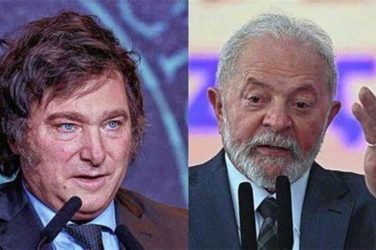Donald Trump’s mass deportation plan hit a brief stumbling block on January 26 when Colombia’s president, Gustavo Petro, refused to allow two US flights carrying deported Colombian migrants to land. Petro’s complaint was that the US government was treating the migrants like criminals by repatriating them in military planes.
Around the same time, the US had also deported dozens of Brazilian migrants. These people arrived in the Amazonian city of Manaus handcuffed, with the Brazilian government expressing outrage over their “degrading treatment”. One of the migrants claimed they were not given any water during the six-hour flight nor were they allowed to use the bathroom.
Petro’s pushback enraged Trump. In a post on his Truth Social media site, Trump wrote: “We will not allow the Colombian government to violate its legal obligations with regard to the acceptance and return of the criminals they forced into the US”. He then threatened Colombia with 25% tariffs and said his government would impose a travel ban on Colombian government officials.
Petro responded by launching a scathing social media attack on Trump. He initially vowed retaliatory tariffs on US goods and also insisted he would not accept migrants who were not treated with “dignity and respect”. But, within a few hours, Petro had backed down.
According to a White House statement released late that evening, Colombia had agreed to all of Trump’s terms. This included the “unrestricted acceptance of all illegal aliens from Colombia returned from the US, including on US military aircraft, without limitation or delay”.
The White House hailed the agreement with Colombia as a victory for Trump’s hardline immigration strategy. In her statement, press secretary Karoline Leavitt wrote: “Today’s events make clear to the world that America is respected again.” But Trump’s punishing tariff threats and foul rhetoric toward illegal immigrants may only damage the power and position of the US in the region.
Setting a bad precedent
As Petro’s row with Trump unfolded, Colombia’s former president Iván Duque accused his successor of engaging in “an act of tremendous irresponsibility”. He stressed that Colombia has a “moral duty” to take back the illegal migrants sent by the US, and highlighted the “enormous” toll sanctions and tariffs would have on the economy.
However, in an interconnected international economic system, Trump’s unilateral threat of tariffs and sanctions can be a double-edged sword.
Colombia is a relatively minor trading partner to the US. But if Petro’s government had refused to comply with Trump’s demands, it still would have meant higher prices for coffee, avocado and several other commodities. In 2022, the US imported US$ 24.8 billion (£20 billion) worth of goods from Colombia – nearly US$2 billion of which was coffee.
Trump’s willingness to wage a trade war with countries in Latin America may also encourage other economies in the region to speed up their search for alternative trade partners. This could lead to more trade deals between Latin American nations themselves.
In May 2023, under the leadership of Brazilian president Luiz Inácio Lula da Silva, 12 South American nations gathered in Brazil’s capital, Brasília, to express their interest in reviving the Union of South American Nations with the explicit aim of bolstering regional trade and cooperation.
The union effectively broke down in 2019 after major nations like Argentina, Brazil, Colombia and Peru withdrew their membership amid concerns about Venezuela’s leadership. But the “Latin America is stronger together” slogan often quoted by political leaders in the region may now actually materialize, thanks to Trump.
Latin American nations are looking further afield, too. The EU established a trade deal with Argentina, Brazil, Uruguay, Paraguay and Bolivia in December 2024, bringing 25 years of on-off negotiations to a close. Trump’s tariff threats could encourage other economies in the region to explore becoming a part of that agreement, potentially at the expense of the US.
And it’s possible that more Latin American countries may eventually seek membership of the Brics bloc of emerging economies, which has repeatedly drawn Trump’s ire for eating into US power and influence. Bolivia and Cuba, alongside seven other countries, were announced as partner states to Brics in late 2024, and more could follow. While not officially part of the bloc, these partner states will get support from its members.
Worse still, Trump’s threats could inadvertently push Latin American nations into the arms of China. During Trump’s first term, his administration coined the term “troika of tyranny” to describe Cuba, Nicaragua and Venezuela. These countries are all led by dictators.
Since then, Beijing has actively pursued a policy of closer cooperation with these countries by making them “strategic competitors” against the US in the region. A 2024 report by researchers at the Center for Strategic and International Studies, an American think tank, even found evidence of suspected Chinese spy facilities in Cuba.
Trump’s uncharitable rhetoric and less-than-civilized treatment of illegal immigrants are, at the very least, likely to fuel more anti-American sentiment in the region. This resentment towards the US may well manifest in building bridges with governments and ideologies that are inimical to US interests.
Amalendu Misra is a professor of International Politics at Lancaster University.
This article was originally published in The Conversation. Read the original article here: https://theconversation.com/trumps-method-for-repatriating-migrants-risks-undermining-us-interests-in-latin-america-248396





